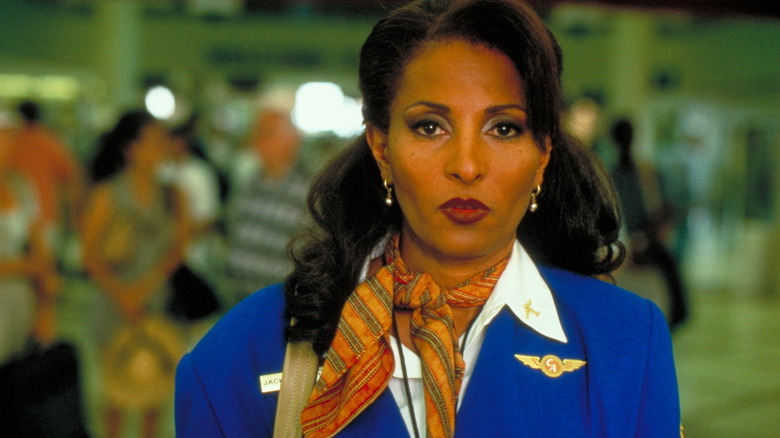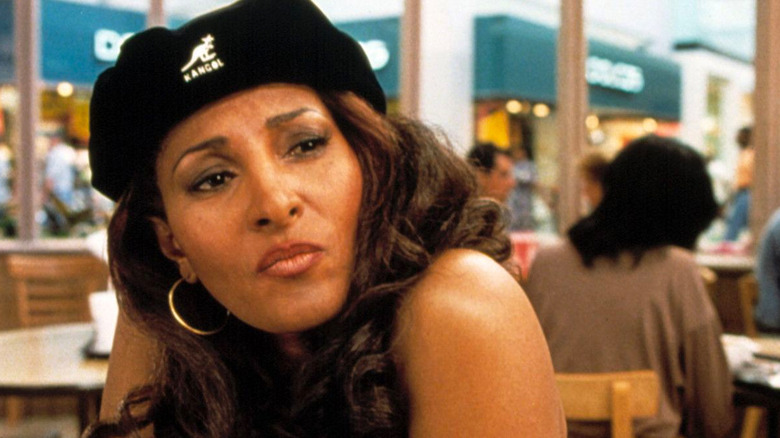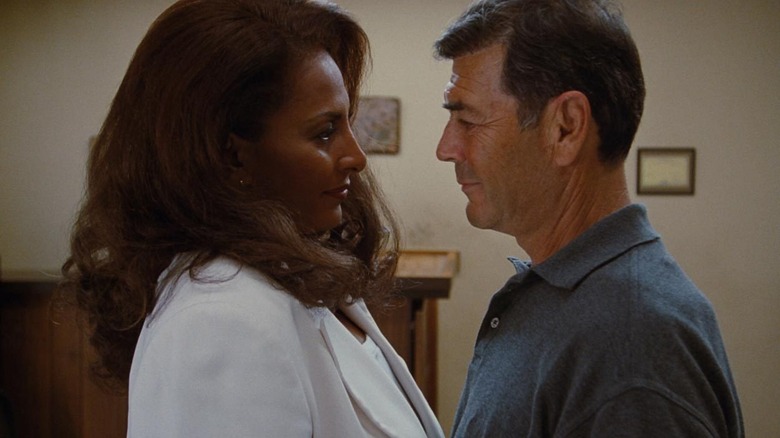Quentin Tarantino Wanted Jackie Brown To Be Birds Of A Feather With Rio Bravo
The mark of a good film is that you can watch it over and over again, according to acclaimed director Quentin Tarantino. Instead of feeling bored by revisiting the same cinematic world, each viewing feels like coming home. The familiarity is comforting, not tedious, and the characters become old friends. For Tarantino, a perfect example of such a movie is Howard Hawks' iconic Western, "Rio Bravo." He wanted his own films to evoke that very same feeling — particularly his 1997 crime world character study, "Jackie Brown."
Tarantino achieved major success in 1994 with "Pulp Fiction," a fast-paced blockbuster of epic proportions that follows several interwoven tales. There's never a dull moment in "Pulp Fiction," but that might have given audiences the wrong idea about what to expect from his subsequent feature, "Jackie Brown."
It would be six years before Tarantino released another film after "Jackie Brown." When he did come back in 2003 with "Kill Bill Vol. 1," he told IGN, "I want to top expectations. I want to blow you away. It's that kind of movie. Now, in the case of something like 'Jackie Brown' ... maybe that worked against me." Where "Pulp Fiction" heavily emphasized narrative and wall-to-wall action. "Jackie Brown" took the time to get to know its characters, and as a result, the story too a bit of a backseat.
"I wasn't trying to top 'Pulp Fiction' with 'Jackie Brown,'" Tarantino recalled. "I wanted to go underneath it and make a more modest character study movie. So, if you were waiting for 'Pulp Fiction' part two, you were going to be disappointed."
Rather than model "Jackie Brown" after his own work, the writer-director chose to imitate one of his own favorite films — "Rio Bravo."
'Jackie Brown' is Tarantino's hangout movie
"Rio Bravo" isn't just one of Tarantino's favorite films because it features Hollywood legend John Wayne in one of his most unforgettable roles, or because it's the triumph of one of the studio era's greatest filmmakers. In fact, his reason might just surprise you.
"One of the things about 'Rio Bravo' that's so wonderful [...] It's one of the great 'hangout movies,'" he said at a Cannes Festival Q&A in 2007. "There are certain movies that you hang out with the characters so much that they actually become your friends." For Tarantino, this "hang-out" quality increases a film's rewatch value. It's why he himself will never get tired of watching "Rio Bravo" over and over again.
"When it's over, they're your friends," the "Once Upon A Time in Hollywood" director added. "And the thing is, what's so good about seeing it again and again and again, is now they're already your friends. Whenever you watch it again, you're just hanging out with John T. Chance, and Dude, and Feathers — they're just, they're friends." The experience that Tarantino had watching "Rio Bravo" was exactly what he hoped to evoke with "Jackie Brown."
"I made 'Jackie Brown' like the way that I always felt about 'Rio Bravo,' which is a movie that I can watch every couple of years," he told IGN. He continued:
"It's just like, 'I know those people now.' Once I saw it once, I got the storyline out of the way and I just hang out with them. Then, it's like, hopefully, if you liked 'Jackie Brown,' every three years or so, you can put it in and you're having screwdrivers with Ordell and you're taking bong hits with Melanie and you're drinking white wine with Jackie and it's all good."
Tarantino wanted the characters in 'Jackie Brown' to feel like old friends
The characters in "Rio Bravo" are more than just characters in Tarantino's favorite movie — they're like his good friends. He's known them for decades, ever since seeing the film as a child with his great-grandmother.
"I actually almost got a headache trying to contemplate how many times I've seen this movie," he confessed at a 2007 Q&A. Tarantino even took cues from "Rio Bravo" about masculinity, since he himself grew up without a father. "Discovering him the way I did, without having a male influence around my house or anything, I bought into that and I started adopting his ideas of what a man was," the filmmaker added. "He just kind of guided me through my life as a kind of surrogate, out-there father somewhere."
So you see, when Tarantino introduces a new girlfriend to "Rio Bravo," he's not just introducing her to a movie — he's introducing her to his life-long companions. "Whenever I'm getting serious with a girl, I show her 'Rio Bravo,'" the director revealed, "and she better f****** like it."
"Jackie Brown" might not move as quickly as "Pulp Fiction," but it's the characters that stay with you, not the story. By the end of that two hour and forty-minute run-time, we know Jackie, we know Melanie, we know Ordell — and, like old friends, we long to see them again.


